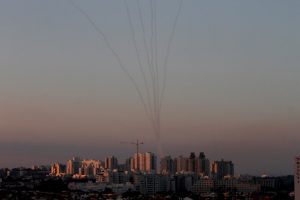Palestinian terror groups in the Gaza Strip agreed to halt their attacks on southern Israel beginning at 3:30 p.m. on Tuesday at the request of Egypt, Palestinian media outlets reported according to toi.com..
News of the alleged ceasefire was accompanied by a salvo of rockets fired at the Hof Ashkelon and Sha’ar Hanegev regions of southern Israel.
One of the projectiles directly hit a home in Hof Ashkelon, causing significant damage to the building, but no injuries, according to the local government.
Israeli defense officials did not immediately comment on the reports of the alleged ceasefire.
On Monday and Tuesday, more than 400 rockets and mortar shells were fired at southern Israel from the Gaza Strip, killing at least one person — a Palestinian man living in Israel with a work permit — and injuring dozens more.
It appeared to be the largest-ever number of projectiles fired at Israel from the coastal enclave in a 24-hour period, more than twice the number fired on any day of the 2014 Gaza war, according to Israeli statistics.
In response to the relentless rocket fire from Gaza, the Israeli military launched a series of ground, air and naval strikes at over 150 targets in the Strip connected to Hamas and Islamic Jihad, said IDF spokesperson Jonathan Conricus.
This included key strategic assets like the Hamas-affiliated Al-Aqsa television station, which Israel says is used to direct and support terror attacks, the spokesman said.
On Tuesday, Egyptian intelligence officials and United Nations Special Envoy to the Middle East Peace Process Nickolay Mladenov scrambled to broker a ceasefire between the two sides.
Israel’s security cabinet convened in the morning at the Defense Ministry’s Tel Aviv headquarters. The discussion continued well into the afternoon.
As rocket attacks continued throughout the day on Monday night and Tuesday, the Israeli army sent reinforcements to the south in the form of additional infantry troops, tanks and Iron Dome batteries.
The military had yet to call up significant numbers of reservists as of Tuesday morning, but IDF Spokesperson Brig. Gen. Ronen Manelis told the Radio Darom station that it may yet do so if the need arises. Small numbers of reserve personnel, mostly from aerial defense units, have been brought into army service, Conricus told reporters by phone.
According to the IDF, more than 400 rockets and mortars have been lobbed at southern Israel since Monday afternoon, which began shortly after 4:30 p.m. when Palestinian terrorists fired a Kornet anti-tank guided missile at a bus near the border, severely injuring an Israeli soldier.
The anti-tank missile attack occurred less than a day after an IDF special operations officer was killed in an operation in Gaza gone awry that also killed seven Palestinian gunmen. Following the clashes, Hamas said “the blood of our righteous martyrs will not be wasted.”
According to the military, over 100 of the incoming projectiles were intercepted by the Iron Dome air defense system. Most of the rest landed in open fields outside of Israeli communities. Dozens exploded inside cities and towns throughout southern Israel, several of them directly hitting homes and apartment buildings in Ashkelon, Netivot and Sderot.
The man killed in one of the direct hits in Ashkelon was later identified as a 48-year-old Palestinian man from Hebron, Mahmoud Abu Asbah, who was living in Israel with a legal work permit.
According to medical officials, at least 27 people were injured in attacks, including the soldier hit in the anti-tank missile attack and two women wounded in direct hits on apartment buildings in Ashkelon. A man in his 40s was also moderately wounded by shrapnel, medics said.
In Gaza, at least six Palestinians — at least five of them later claimed by terrorist groups as members — were killed in the IDF’s raids on Monday and Tuesday, apparently in airstrikes on rocket-launching cells, according to the Hamas-controlled Gaza health ministry.
In recent weeks, Egyptian and UN mediators had appeared to be making progress in brokering informal understandings aimed at quieting the situation.
Last week, Israel allowed Qatar to deliver $15 million to Gaza to allow cash-strapped Hamas to pay the salaries of thousands of government workers. At the same time, Hamas has lowered the intensity of the border protests in recent weeks.
The fighting on Monday and Tuesday cast doubt over understandings previously brokered by Egypt and UN officials to reduce tensions. On Sunday, Prime Minister Benjamin Netanyahu had defended those understandings, saying he was doing everything possible to avoid another “unnecessary war.”



